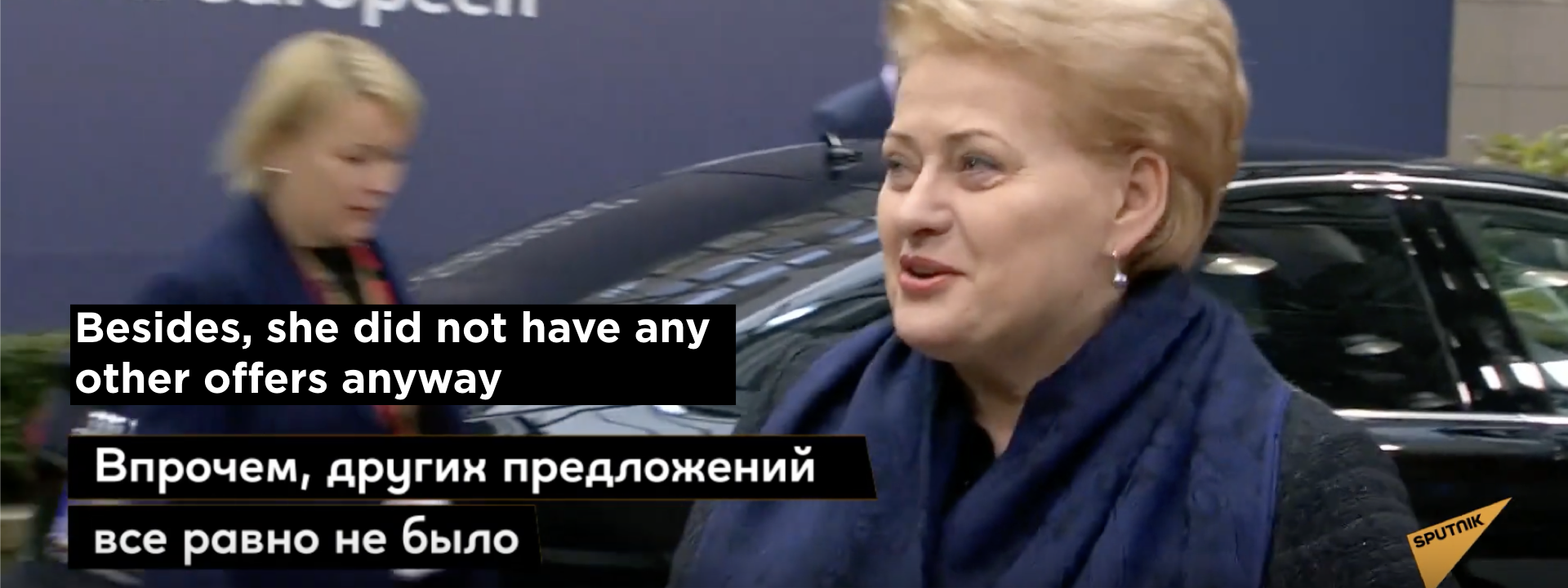Grybauskaitėphobia: Kremlin media in Baltic states target former Lithuanian president
Sputnik, Baltnews, and Rubaltic.ru shared negative messages about Dalia Grybauskaitė’s career
Grybauskaitėphobia: Kremlin media in Baltic states target former Lithuanian president

Sputnik, Baltnews, and Rubaltic.ru shared negative messages about Dalia Grybauskaitė’s career

Kremlin-owned outlets Sputnik and Baltnews, as well as pro-Kremlin media outlet Rubaltic.ru, shared the same negative stories about former President of Lithuania Dalia Grybauskaitė. The messaging focused on discrediting her professional career and targeted Russian-speakers in the Baltic states.
This case is part of a wider attempt to smear former leaders of the Baltic states who held clear anti-Kremlin positions, including former Latvian president Vaira Vike-Freiberga and former Estonian president Toomas Hendrik Ilves. These stories deliver a concerted message: for Baltic politicians, “Russophobia” can wreck careers.
United Nations Women, a UN entity that promotes women’s empowerment, recently invited Grybauskaitė to serve as ambassador of the Champions for Generation Equality initiative, which seeks to achieve gender equality in work, education, healthcare, and public interest decisions. While many media outlets in Lithuania and Russia presented the invitation as an honor, Sputnik, Baltnews, and Rubaltic.ru framed it as an embarrassing demotion for the former president of Lithuania.
Media coverage
Lithuanian public broadcaster LRT reported on Grybauskaitė’s appointment on September 24, 2019, based on a press release from her office. LRT characterized the invitation as a recognition of Grybauskaitė’s career as a world leader:
At the high-profile Concordia Forum, the largest event of the United Nations (UN) General Assembly Week, the President has been invited as a guest of honor, as one of the few female leaders of a country who was a president for ten years and a leader at the Council of Women World Leaders (CWWL) for five years.
The DFRLab identified similar framing on other media outlets reporting in Lithuanian, including Lrytas.tv, Delfi.lt, Vilniaus Kraštas, Respublika, TV3.lt, Karštas Komentaras, Slaptai.lt , Jūsų Panevėžys, Žmonės, as well as those reporting in Russian, Litovky Kuryer, Ru.Delfi.lt, and one reporting in Polish, L24.lt.
Many Russian media outlets, such as the pro-Kremlin sites Pravda.ru, Komsamolyskaya Pravda, and Rambler, cited the news from the Kremlin-owned outlet Parlamentskaya Gazeta, which initially framed Grybauskaitė’s appointment as an honor and a recognition of her status as a female world leader. At the end of its article, however, Parlamentskaya Gazeta added that Lithuanian society had expected Grybauskaitė to take a high position at a governing body of the European Union.
The main message that Kremlin-owned and pro-Kremlin media outlets disseminated was that Lithuanians were supposedly disappointed in Grybauskaitė for failing to achieve a higher position after serving as president.
Unified negative coverage from Kremlin media
Kremlin-owned media outlets in the Baltic states, including Sputnik and Baltnews, in addition to the pro-Kremlin outlet Rubaltic.ru, coordinated to share three stories related to the news of Grybauskaitė’s UN invitation:
1. An initial story based on the press release by Grybauskaitė’s office;
2. A negative opinion piece focusing on a story put forth by pro-Kremlin expert Aleksandr Nosovich on his radio show; and
3. A negative video with captions suggesting that Grybauskaitė’s career was failing.
At least one of these three stories appeared on each of the three media outlets in one of the three Baltic states within the period of September 24–27, 2019.
On September 24, 2019, all three outlets reported that Grybauskaitė had received an invitation from U.N. Women.

Baltnews Lithuania used the most negative headline to frame the story, emphasizing that Grybauskaitė received a public pension after she retired and dismissed the UN Women invitation as a new “hobby.” Rubaltic.ru framed the offer as “feminist,” a pejorative term in the outlet’s eyes, while Sputnik Lithuania provided the most neutral framing of the three outlets in both Russian and Lithuanian.
The following day, September 25, 2019, Rubaltic.ru columnist Aleksei Iljashevich published a lengthy article downplaying Grybauskaitė’s invitation as “not the most prestigious,” while also noting that “Grybauskaitė cannot expect anything more.” Sputnik Lithuania and the Latvian news aggregator Reitingi.lv republished Iljashevich’s article one day later.
Another Rubaltic.ru columnist, Aleksandr Nosovich, gave an interview to Sputnik Lithuania concluding that “Grybauskaitė’s reputation was blown-up,” meaning overrated, and that “all Grybauskaitė can do now is use the fact that she is a woman who was president of a small country for 10 years.” The interview was published by Sputnik Lithuania as well as Sputnik Latvia and Sputnik Estonia. All three outlets came up with different headlines to reflect Nosovich’s opinion.

Finally, Sputnik and Baltnews shared a YouTube video titled, “From a secret KGB agent to a feminist: Dalia Grybauskaitė’s career.” Sputnik published the video on September 25, 2019, with Baltnews following a day later. The timing of the videos and different branding suggested that Sputnik produced the video first. Baltnews then used the video and adapted it with its typeface and logo before publishing. In August 2018, Skype conversations between the editor of Baltnews and a person from the Kremlin-owned media organization Rossiya Segodnya that owns Sputnik became public; in the conversations, the two revealed how Kremlin-owned outlets coordinate on topics they were supposed to cover. A similar exchange of content assets could have taken place in regards the negative video about Grybauskaitė’s career.

The video appeared on Sputnik Lithuania and Sputnik Estonia on September 26, 2019, as well as on Sputnik Latvia on September 27, 2019. Baltnews published the video only on its Lithuanian edition on September 26, 2019. The timing suggested that the initiative to create the video came from the centralized Sputnik news bureau, which runs the YouTube channel that first posted the video.
The DFRLab did not find any local language versions of the negative stories mentioned above.
The source material, negative message framing, and timing of the stories that Sputnik, Baltnews, and Rubaltic.ru shared about Grybauskaitė’s invitation suggested a synchronized attempt to smear the former president, who expressed anti-Kremlin positions during her presidency.
Follow along for more in-depth analysis from our #DigitalSherlocks.

